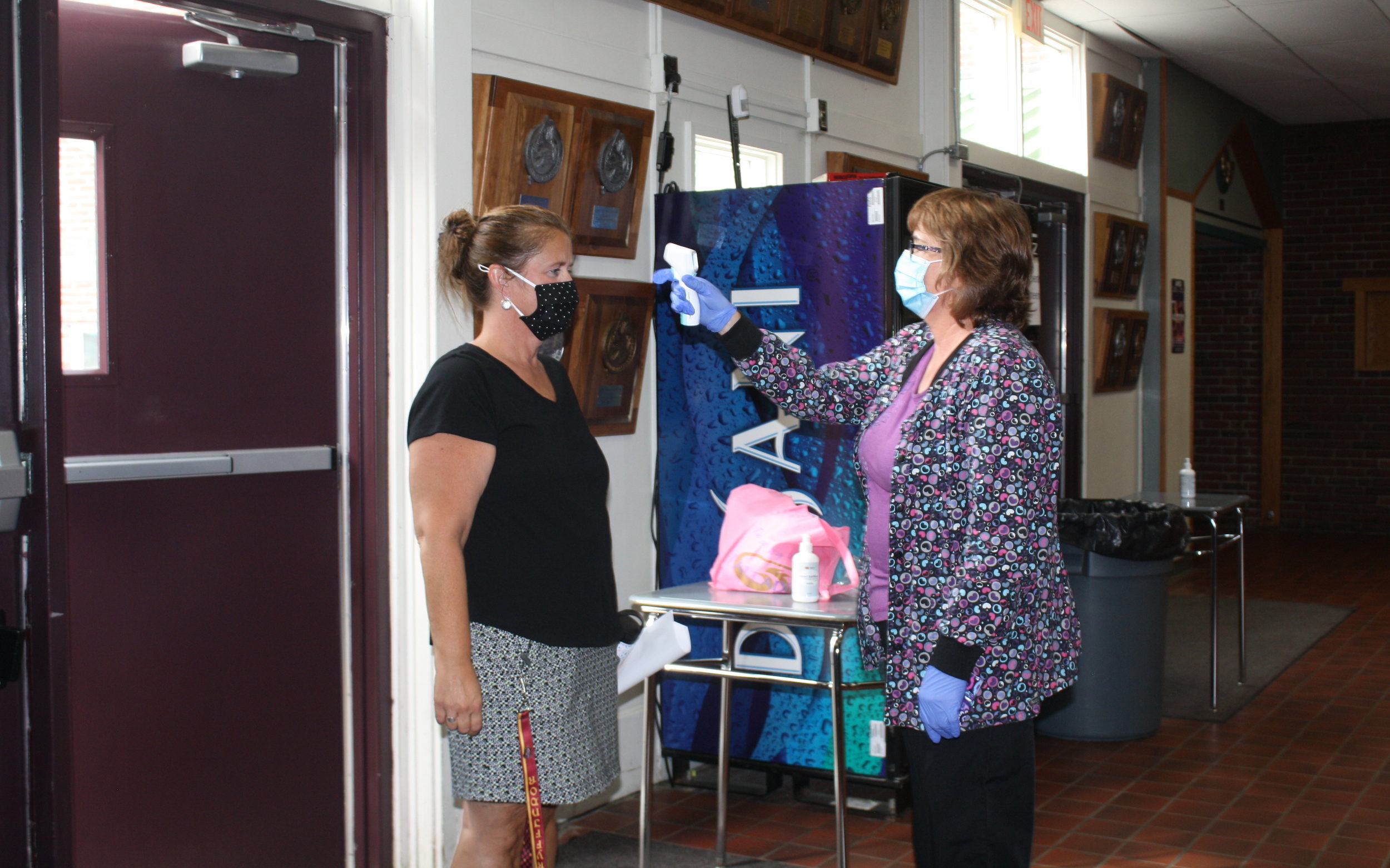
CARIBOU, Maine — RSU 39 board members, teachers and administrators gathered at Caribou High School on Monday for the first of three planned rehearsals of the hybrid learning model that will begin the 2020-21 school year.
The group replicated the basic social distancing measures that will become everyday routines, including temperature checks at entryways, traffic patterns in the hallways and classroom cleaning protocols.
Participants acted as students in classrooms, practicing the appropriate times to enter and leave rooms and how to disinfect desk and table surfaces after class.
CHS Principal Eric McGough said the first rehearsal was intended to help the staff recognize aspects of the daily routines that need to be altered for greater student safety before the students arrive on Aug. 24.
McGough hopes to soon schedule a second rehearsal with staff members and a third that will involve a select group of high school students. He encouraged those who participated on Monday to be critical and point out any concerns they have.
“We actually anticipate finding things to correct so that we won’t run into those issues when the students are here,” McGough said.

Leland Caron, principal of Caribou Community School (back, left), Lisa Anderson, computer science teacher, Kyle Gilson, Caribou High School math teacher (back, right) and Jane McCall, RSU 39 assistant superintendent, participate in a rehearsal of hybrid learning at CHS on Monday, Aug. 10. Credit: Melissa Lizotte | The Star-Herald)
With the hybrid learning model, students will be divided into two groups. The first group will attend school on Monday and Tuesday and participate in remote learning during the remainder of the week. Students in the second group will complete remote learning Monday through Wednesday and attend in-person classes Thursday and Friday.
The school will do a “deep cleaning” of classrooms and other spaces every Wednesday.
Among the topics brought up for discussion after rehearsal was how to motivate students to keep their mandatory face masks on throughout the school day, especially during the hotter weeks leading up to harvest break, while still giving them times to take breaks from the masks.
McGough said that each classroom will have a designated space in the back of the room, closed off with a clear shower curtain, for students who wish to take off their masks while still completing class work. But he also noted that he would consider an idea to have students take off their masks at their desks during periods of class when they complete independent assignments.
RSU 39 superintendent Tim Doak clarified that staff will call those periods “mask removal times” instead of “mask breaks.”
“It won’t be a time for students to use their cell phones and talk with friends. They have to be working on something,” Doak said.
McGough clarified that if any emergency were to arise, students and staff would not be bound to the social distancing guidelines. They could lock and block classroom doors and gather in the same corner of the room, for instance, during an active shooter situation. In the event of a fire or other school evacuation, they would not need to abide by the established traffic route.
But, in general, how students transfer from one class to another and interact during class periods will be vastly different from the days before COVID-19.
Students will follow arrows on the floor in the hallways that will guide them in the direction of their classrooms. Much like the pattern of a roadway, anyone walking on the left or right side of the hallway must remain on that side and not loiter.
The rehearsal allowed staff members to experience that traffic pattern for themselves and point out areas where students might be confused, such as an arrow that diverts from the main path toward the gymnasium. Currently, that arrow is only intended for students entering the gym for physical education class.
McGough noted that having four class periods per day instead of seven will reduce the number of transition times between classes. If a student ever were to leave class to use a restroom or go to the main office, they would be allowed to cross the hallway. This exception is due to the unlikely chance that many people will be in the hallway during those times.
Staff members discussed other topics after rehearsal, including materials they might purchase to help teachers speak more clearly with masks on and how to conduct the classroom cleanings more efficiently.
Doak acknowledged the limitations that will be placed on students during the coming school year, but said that the district must abide by Maine Department of Education recommendations to mitigate the risk of COVID-19 spread and ensure that the school can move to a full-time class model, or “green” model, sometime this fall.
“There are a lot of procedures that we’re all going to have to get used to,” Doak said. “We’ll likely spend most of the first week going over how to conduct everything.”







